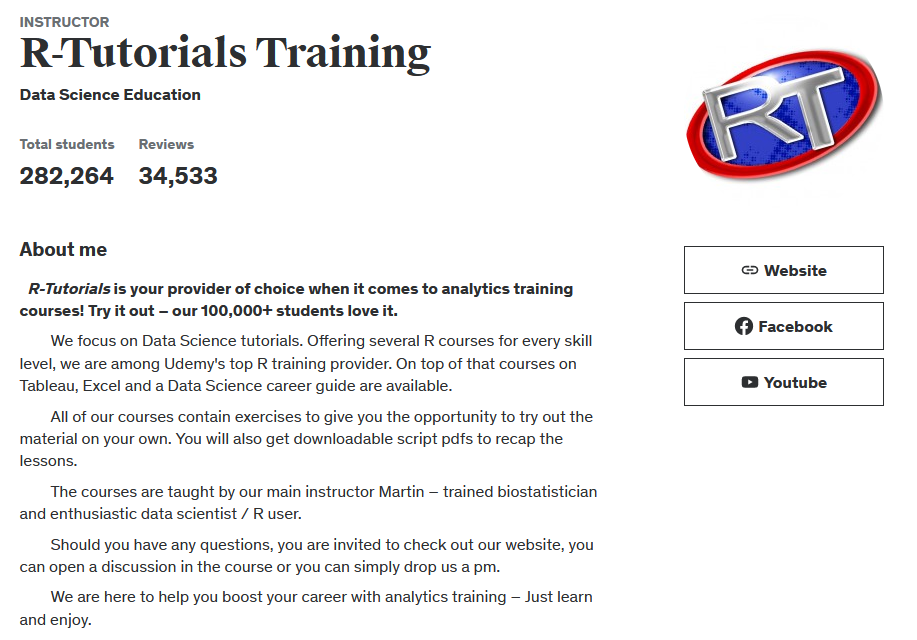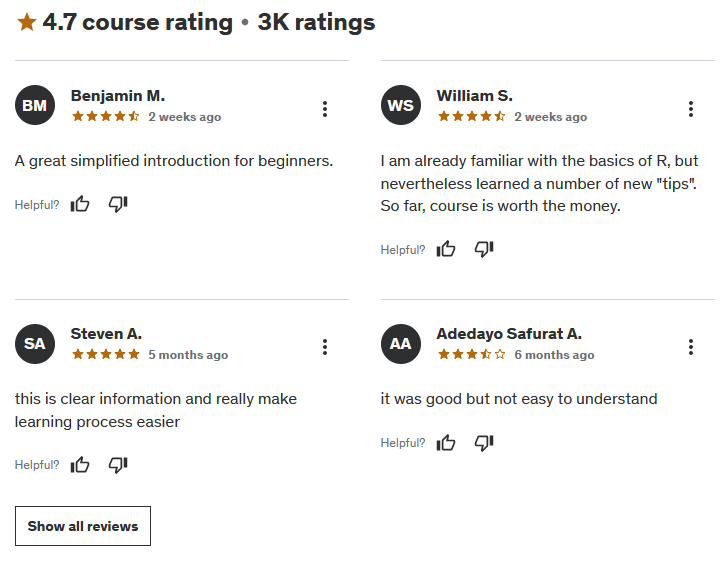As someone constantly on the lookout for comprehensive and structured learning paths in data analytics, stumbling upon “R Level 1 – Data Analytics with R” on Udemy was akin to finding a treasure trove. Taught by R-Tutorials Training, this course promises to equip learners with the essentials of R for Data Analytics and Mining. Here’s a casual walk-through of what this course has to offer.
Right off the bat, the course sets a welcoming tone for newcomers and those with a basic understanding of R. It positions itself as a foundational step towards mastery in R, promising to address the common hurdles learners face due to scattered resources. The course description and the instructor’s approach of applying the Pareto principle for an efficient learning curve intrigued me. It seemed like this course was designed with the practical challenges of learning R in mind.
Instructor Reputation
When considering an online course, the instructor’s expertise and teaching style are paramount, and “R Level 1 – Data Analytics with R” is helmed by an instructor whose credentials speak volumes. The course is taught by Martin, the main instructor from R-Tutorials Training, an entity that has carved out a niche in data science education on Udemy. With an impressive instructor rating of 4.4 based on over 34,000 reviews, Martin’s ability to convey complex data analytics concepts in an accessible and engaging manner is well-documented.

Martin’s background as a trained biostatistician and his enthusiasm as a data scientist and R user add layers of depth and authenticity to the course content. His approach is not just about teaching R as a programming language but about imbuing students with the ability to apply statistical programming to real-world data analytics problems. This is reflected in the course design, which balances theoretical knowledge with practical applications, ensuring that students not only learn R but understand its relevance and application in data analytics.
The course’s success, as indicated by the enrollment of over 282,264 students across 24 courses offered by R-Tutorials Training, underscores the trust and value learners place in Martin’s teaching. The testimonials and reviews highlight his clear and concise instruction, the practicality of the course content, and his responsiveness to students’ queries. This level of engagement and support is crucial for online learning, where the absence of face-to-face interaction can often lead to disengagement.
Furthermore, Martin’s commitment to education is evident in the additional resources provided to students, including downloadable script PDFs for recap and an extensive R exercise database accessible through the R-Tutorials website. This comprehensive support system enhances the learning experience, enabling students to practice and solidify their understanding of R programming outside the structured course environment.
In summary, Martin’s reputation as an instructor is built on a foundation of profound subject matter expertise, a passionate and engaging teaching style, and a commitment to student success. His approachable manner, combined with a rigorous and practical course structure, makes “R Level 1 – Data Analytics with R” a standout offering for anyone looking to dive into the world of R and data analytics.
Course Structure
The structure of “R Level 1 – Data Analytics with R” is meticulously designed to cater to both beginners and those with some prior experience in R, ensuring a comprehensive learning journey. The course kicks off with an introduction to R, setting the stage for a deep dive into the language’s core aspects. This foundational segment is crucial for building confidence in learners new to R or statistical programming, providing them with the context and understanding needed to tackle more complex topics.

Following the introduction, the course delves into the theoretical background necessary for mastering R. This includes a detailed exploration of object and data types in R, which is essential for anyone looking to manipulate data effectively within the language. Martin’s approach to teaching these concepts is both thorough and accessible, ensuring that students grasp the fundamental principles that will inform their future work with R.
The course structure then transitions to practical applications, with significant emphasis on programming constructs such as functions and loops. This section is particularly valuable, as it equips learners with the skills to automate repetitive tasks and perform complex data manipulations, a cornerstone of efficient data analysis. The inclusion of the apply family of functions for looping presents an advanced R programming technique, reinforcing the course’s commitment to delivering practical and actionable knowledge.
A distinctive feature of the course is its focus on data visualization, a critical skill in data analytics. Through detailed instructions and examples, students learn how to create and customize various types of graphs using R’s base graphics system. This hands-on approach not only teaches the technical skills needed to generate boxplots, histograms, and piecharts but also instills an understanding of the importance of visual data representation in conveying insights effectively.
In addition to RStudio, the course introduces learners to R Commander, offering an alternative GUI for conducting hypothesis tests and other statistical analyses. This inclusion broadens the learners’ toolkit, showcasing the versatility of R and its applications in data analytics.
The course is peppered with exercises and quizzes to reinforce learning and assess understanding. Martin’s commitment to active learning is evident in the course’s structure, which encourages students to apply what they’ve learned through practical exercises. Furthermore, the provision of downloadable code PDFs for each section allows learners to practice the code on their own, enhancing their learning experience by doing.
Overall, the course’s structure is a well-thought-out blend of theory and practice. It systematically builds up learners’ knowledge and skills in R, from basic concepts to more advanced applications, ensuring a comprehensive understanding of R as a tool for data analytics.
Content Quality
The quality of content in “R Level 1 – Data Analytics with R” is impressive, reflecting a well-balanced mix of theoretical depth and practical application that caters to the needs of a diverse audience, from complete beginners to those with intermediate skills seeking to solidify their understanding of R. The course content is meticulously curated to ensure that learners not only grasp the syntax and functions of R but also understand the statistical principles that underpin data analytics and mining.

One of the standout aspects of the course’s content is its clarity and comprehensiveness. Martin has a knack for breaking down complex topics into digestible segments, making heavy topics approachable without sacrificing depth. This clarity is crucial for learners to build a solid foundation in R, enabling them to progress to more advanced topics with confidence.
The course’s emphasis on practical skills is evident in its detailed tutorials on creating various types of graphs, handling different data types, and implementing loops and functions. These sections are particularly valuable as they equip learners with the tools to perform data manipulation, analysis, and visualization – skills that are in high demand in the data science field. The practical exercises included at the end of each section reinforce the learning objectives, allowing learners to apply what they’ve learned in real-world contexts.
Moreover, the inclusion of downloadable script PDFs for each section is a thoughtful addition, serving as a handy reference for learners to review and practice the course material at their own pace. This resource enhances the learning experience by providing learners with the means to experiment with the code and troubleshoot issues independently, fostering a deeper understanding of the material.
However, some learners have pointed out that certain sections could benefit from additional context or a slower pace to accommodate those without a strong background in mathematics or statistics. This feedback suggests that while the course excels in delivering high-quality content, there’s an opportunity to make it even more inclusive by adjusting the pacing or providing supplementary materials for those needing extra support in these areas.
Overall Course Rating – 8.5/10
Taking into account the comprehensive curriculum, the depth and clarity of the content, the practical exercises, and the instructor’s expertise, I would rate “R Level 1 – Data Analytics with R” an 8.5 out of 10.

This is a standout course that delivers on its promise to provide a solid foundation in R for data analytics. The course is structured in a way that makes learning R accessible and engaging, catering to both beginners and those looking to deepen their understanding of statistical programming.
However, the feedback regarding the need for additional context in some sections and a more accommodating pace for learners with varying backgrounds in mathematics and statistics indicates room for improvement. Addressing these concerns could enhance the learning experience for a broader audience and ensure that all learners can fully grasp and apply the course material.
In conclusion, this is a highly recommended course for anyone interested in learning R for data analytics. Its strengths far outweigh the minor critiques, making it a valuable investment for those looking to enhance their data analytics skills and advance their careers in the field of data science.



